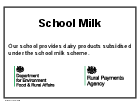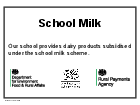Rural Payments Agency

class="gem-c-govspeak govuk-govspeak govuk-!-margin-bottom-0">
This guidance is for milk consumed from 1 September 2024. The guidance for milk consumed before 1 January 2021 has been archived.
The school milk subsidy scheme subsidises the cost of milk, certain milk products and yoghurts for schoolchildren in England and Wales. This means schools can sell the products to children at a lower price. Schools must offer drinking milk before they can supply other eligible milk products or yoghurts.
The Rural Payments Agency (RPA) runs the scheme in England and Wales.
Contact RPA
School Milk Subsidy Team
Rural Payments Agency
Lancaster House
Hampshire Court
Newcastle Business Park
Newcastle upon Tyne
NE4 7YH
Email: trader@rpa.gov.uk
Telephone: 03300 416 500
Find about call charges
Who can apply for the school milk subsidy
You can apply for school milk subsidies if you are a:
- school
- local authority
- supplier
- organisation set up for this purpose
To claim for the subsidy you must meet the rules, in particular themaximum selling price rules.
What products can be subsidised
The following products from cows, goats and sheep are eligible for the subsidy:
- whole or semi-skimmed heat-treated milk
- whole or semi-skimmed heat-treated flavoured milk, containing at least 90% by weight of milk and a maximum of 7% added sugar or honey (only the milk element is eligible for the subsidy)
- whole or semi-skimmed plain yoghurt
- lactose free or lactose reduced milk
- UHT milk
Products must also be of EU origin and comply withRegulation EUR 2004/852 and Regulation EUR 2004/853. These include the rules on preparing the products in an approved establishment and the identification markings the products must have.
Subsidised products must be distributed to pupils as a:
- mid-morning or afternoon drink
- a drink with a meal
- a separately identifiable part of a meal (so the milk must retain its identity and not be altered or incorporated as an ingredient)
What products are not eligible
You cannot apply for a subsidy for:
- products used as ingredients in the preparation of meals
- milk other than from cows, goats or sheep (for example, soya or rice milk)
- powdered or reconstituted milk
- products used as ingredients in the preparation of meals where milk has lost its identity (for example, custard, mashed potato or rice pudding)
- products that have been consumed by staff or visitors
- products that have been delivered but disposed of (rather than consumed by eligible pupils)
- products that have been consumed on non-educational days (for example, Sundays for boarding school pupils)
- products containing more than of 5mg of added fluorine per kg (if added as sodium fluoride this equates to 11mg of sodium fluoride per kg)
Who is eligible for the subsidised products
In England and Wales, pupils are eligible if they regularly attend an Ofsted-registered:
- pre-school
- nursery
- primary school
- secondary school
All pre-school children who are under 5 years old and in day care are eligible for free milk under the Nursery Milk Scheme.
Pupils under 5 years old (rising fives) in primary education reception classes are eligible under either the School Milk Subsidy Scheme or theNursery Milk Scheme but not both.
In Wales, pupils in Key Stage 1 are also eligible for free milk funded by the Welsh Government.
Who is not eligible
The school milk subsidy scheme does not cover:
- children in pre-schools where the milk has been fully reimbursed under the Nursery Milk Scheme
- pupils in further education colleges
- pupils in higher education colleges or universities
- pupils in holiday camps
- boarding pupils on days when theyre not receiving formal education
Advertise subsidised milk in schools
Schools distributing products subsidised under the school milk subsidy scheme must display a poster advertising that theyre participating in the scheme.
The poster must be clearly visible and readable and permanently situated at the main entrance of the school.
You can design your own poster, but it must comply with the requirements in Article 12 of Regulation EUR 40/2017 . (As amended and now Assimilated Law).
Or, you can download and use one of the following posters which must be A3 or bigger and the lettering at least 1cm high.
Ministerial Departmental News
- PM's Office, 10 Downing Street
- Cabinet Office
- Department for Business, Innovation and Skills
- Department for Communities and Local Government
- Department for Culture, Media and Sport
- Department for Education
- Department for Environment, Food and Rural Affairs
- Department for International Development
- Department for Transport
- Department for Work and Pensions
- Department of Energy and Climate Change
- Department of Health
- Foreign and Commonwealth Office
- HM Treasury
- Home Office
- Ministry of Defence
- Ministry of Justice
- Northern Ireland Office
- Scotland Office
- Wales Office
- See all departments


